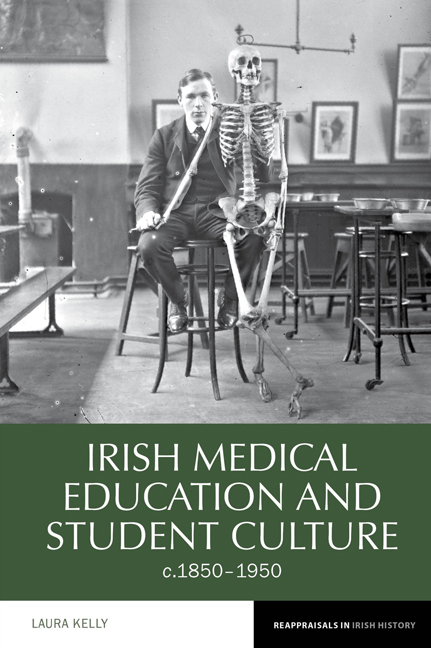Book contents
- Frontmatter
- Contents
- List of Figures
- List of Tables
- Acknowledgements
- List of Abbreviations
- Introduction
- 1 The Medical School Marketplace, c.1850–1900
- 2 ‘Entering upon an Honourable and Important Profession’: Irish Medical Student Image and Representation in the Age of Medical Reform, c.1850–1900
- 3 Beginnings: Medicine and Social Mobility, c.1850–1950
- 4 Educational Experiences and Medical Student Life, c.1880–1920
- 5 ‘Boys to Men’: Rites of Passage, Sport, Masculinity and Medical Student Culture, c.1880–1930
- 6 ‘This Feminine Invasion of Medicine’: Women in Irish Medical Schools, c.1880–1945
- 7 Medical Education and Student Culture North and South of the Border, c.1920–1950 200
- Conclusion
- Bibliography
- Index
3 - Beginnings: Medicine and Social Mobility, c.1850–1950
- Frontmatter
- Contents
- List of Figures
- List of Tables
- Acknowledgements
- List of Abbreviations
- Introduction
- 1 The Medical School Marketplace, c.1850–1900
- 2 ‘Entering upon an Honourable and Important Profession’: Irish Medical Student Image and Representation in the Age of Medical Reform, c.1850–1900
- 3 Beginnings: Medicine and Social Mobility, c.1850–1950
- 4 Educational Experiences and Medical Student Life, c.1880–1920
- 5 ‘Boys to Men’: Rites of Passage, Sport, Masculinity and Medical Student Culture, c.1880–1930
- 6 ‘This Feminine Invasion of Medicine’: Women in Irish Medical Schools, c.1880–1945
- 7 Medical Education and Student Culture North and South of the Border, c.1920–1950 200
- Conclusion
- Bibliography
- Index
Summary
Medicine was a logical choice for me when I went to university. One could say that I had been initiated into it at the age of three when I first injured my ankle … My tuition had begun in the garden during my years of enforced inactivity, fortified by my visits to Dr. Minnittapos;s surgery. I was drawn by the humour of the various scenes I witnessed, rather than by a precocious interest in medicine but when the time came no other possibility entered my mind.
Writing in his memoirs in 2007, Dr Louis Courtney recalled his enrolment in University College Dublin in 1912. Like many other students, Courtney was inspired by childhood experience of illness to pursue a medical education. Upon arriving in Dublin from Nenagh, Co. Tipperary, Courtney recalled finding digs and his immediate enrolment in the university sports clubs. Courtney was just one of thousands of medical students who have passed through Irish institutions since the nineteenth century. This chapter will explore the changing social and religious backgrounds of medical students at Irish universities in the period, as well as investigating students’ varied reasons for studying medicine and the factors that impacted upon their choice of medical school over the period. As will become clear, the reasons why students entered into medical education were often personal and varied; however, students and their parents in both the nineteenth and the twentieth centuries were often driven by social mobility. An assessment of the social and religious backgrounds of students matriculating at Irish universities in the nineteenth and early twentieth centuries suggests that these varied from one institution to another.
Reasons for studying medicine and choosing a medical school
In their memoirs, Irish doctors often recalled the reasons why they decided to pursue medical study. Some students were very much aware of the opportunities that medical study could bring. Others, like J. Johnston Abraham, who studied at Trinity College Dublin in the late nineteenth century, recalled having simply wanted to be a doctor since their childhood. Joyce Delaney, a student at Trinity College Dublin remarked that she was ‘always filled with a sodden sense of shame’ when she listened to her friends’ ‘laudable motives for taking up the practice of Medicine’. Delaney believed that she became a doctor because she ‘couldn't think of anything else to do’.
- Type
- Chapter
- Information
- Irish Medical Education and Student Culture, c.1850–1950 , pp. 71 - 103Publisher: Liverpool University PressPrint publication year: 2017

